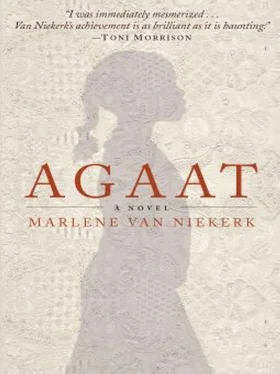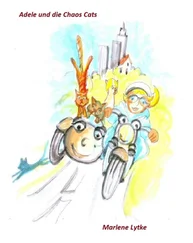He rocked drunkenly on his feet.
Don’t you have anything to say then! What does one have to do to make you wake up? Spineless! That’s why things will end badly for us! That’s why the enemy is sharpening its teeth on our borders! The Afrikaner women, they who should be carrying the torch, they’re useless, the Afrikaner youth, characterless, without ideals, even the Afrikaner skivvies are struck dumb! Is this what our ancestors tamed this land for with their muzzle-loaders, with the clothes on their bodies and their wagons against the barbarian hordes? Come, Agaat, where are the days when your kind cut the throats of their masters in their sleep?
Then you’ll have something to write about, instead of the sentimental chirry-chirping of yours, one two buckle my shoe, onky-bonky here’s my donkey, pat-a-cake, as if you’re in a children’s book, not exactly top secrets that you’re sharing with your kleinbaas the traitor!
Jak sank unsteadily into an armchair, mumbled something now and again, more and more slowly, like a piece of clockwork running down.
Jakkie remained slumped with his head on his arms. After a while he no longer looked up.
You looked at the head, the shape of it exactly like Jak’s, the unshaven cheek of the strange young man, your son, amongst the dishes of food and the dirty plates, his lips muttering in the salt through which the spilt wine was starting to seep pinkly. You looked at Agaat whose eyes rolled slowly from side to side like those of a chameleon without her turning her head an inch left or right. A fly settled on the cauliflower. Agaat flapped it away.
You remained sitting there, you and Agaat, long after the talking had ceased. There was only the ticking of the grandfather clock, the quarter strokes of two quarters, the bothersome fly around your heads. Then Agaat got up. She avoided your eyes, touched her cap to feel if it was properly settled.
Let’s take them to their rooms, she said.
As if it were the most ordinary thing on earth.
You put your arms around them, under the arms, between you, down the passage, first one, then the other, got them to their beds, took off their shoes.
Was it later that night, or the following night, or only after the weekend that you tried to check, emptied out the tablets on your bedspread, tried to count them, the drops, the powders? But you couldn’t remember how many of everything there was supposed to be. And in those weeks before the feast you were in any case taking more of everything. Agaat counted out your pills for you in the morning and put them out on your dressing table because you could sometimes not remember whether you’d taken them, so dosed yourself double in the evenings and then was too drained the next day to do anything.
Would she have gone so far as to doctor Jak and Jakkie’s drinks? You didn’t dare ask her. You were scared she’d say something about the letters. You went and checked in your handbag, in the carrier bags in your wardrobe, to see whether there was perhaps one that you’d forgotten to post. The one, the ode on Grootmoedersdrift, you looked for that again, but you couldn’t find it. You found nothing. You were scared. Suddenly it was important to be able to remember the smallest detail exactly. But you couldn’t remember. Things had slipped in your memory. Had you let slip something, to Jak, to Jakkie, was it from that that Jak could make out that you’d read Agaat’s letters? Or had Agaat brought it to their attention?
You remembered the diaries. After Jakkie joined the Defence Force you’d stopped keeping a diary. You collected the booklets in the top cupboard of the spare room where you’d pushed them in amongst the eiderdowns. You paged through a few. Could you perhaps have hidden some of Agaat’s letters that you’d forgotten to post in them? Your eye fell here and there on what you’d written. What of any importance could anybody read into them?
That’s what you thought but you weren’t sure. Your handwriting struck you as strange, more upright, harder than you thought of yourself as writing. You tied the booklets up in piles with kitchen string. Your hands were trembling. You locked them in the sideboard with the other documents.
There you stood in the sitting room, shaky, after you’d locked up the books. The sideboard gleaming, darker than usual. The dining-table, cleared, glossy, with a vase of flowers on top. No sign of the meal earlier or of the discord. But the dining room felt ominous. Every familiar thing was, under its surface, at its core, as if charged with dynamite.
You felt somebody was looking at you, there where you were standing with the key of the sideboard in your hand, but the curtains were drawn, the back door was closed, there was nobody. Here it is now, you thought, the last link that’s chafing through. Everything you lived for, everything that you built up, all the facades that you maintained, the whole lie that you lived. The last link.
The key was sweating in your hand.
At last you slapped it down on the table for all the world to see.
You went and sat on a chair in your room in the dark, a woman over an abyss, the coming of morning a ghastliness, the first thrush a deathly herald. Agaat bringing your coffee and saying nothing about your just sitting there in the previous night’s clothes, just raising her eyebrows over the pills that she’d put out for you and that you’d not taken.
You were scared of her. More scared of her when she was right under your eyes than behind your back. You cringed away from the brisk pace at which she kept doing her work. It was as if she’d been beating you with sticks, with irons, since the previous evening, and still now, the day of the feast. You couldn’t believe it, the calm cheerful face she put on.
Till late that night she kept it up.
Till the flying in the aeroplane.
Only then could you breathe in an odd sort of way.
Then it was her turn to be beaten.
Was it the abominations of your own family that opened your eyes to the power or impotence branded on the faces, the whitewashed disgraces of the guests who started arriving in groups or pairs the following day? Was it the lack of sleep? The pills you hadn’t taken? So that you, for the first time in how many years, were soberly and austerely aware of what was happening around you?
12 August 1985. You are cordially invited.
You suddenly saw everything so clearly through Jakkie’s eyes, pe-eep squeak the wives, bu-urp croak the husbands, the high-pitched little-girl voices in which the women twittered, the coarse bravado of the men, the children insolent or timorous, the childminders, feigning docility, but already casting long glances towards leftovers in the kitchen, bread, fat, candles and cloths and soap and matches. A pillage it would be again, as always.
You saw yourself standing in the garden mirrors, in your red dress. You heard your voice warbling. You shook the hands, pressed your cheek against the powdery cheeks of the women, kissed the slobbery mouths of the men.
My mother is pathetic, they keep each other pathetic, the whole community. Jakkie’s words of the previous day. Your child. Blood of your blood. Not impossible, surely, that his message had taken effect on you immediately. Brainwashing, another voice in you protested, that’s how subversion and brainwashing operate.
Welcome, welcome to Grootmoedersdrift! you said again and again.
Clearly I’m stuck between two cycles of brainwashing, and me without my pills as well.
You looked at Jak and Jakkie, emboldened in their display by a need to make up for the previous evening. Both ashamed of their lack of memory, they tried to tell each other what a load of crap they’d talked. Agaat rubbed it in. The Alka Seltzer and the vitamins, the big can of orange juice and the pot of strong coffee that stood ready by their breakfast plates that morning.
Читать дальше












